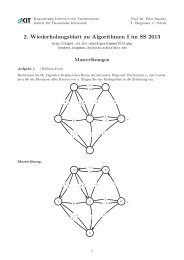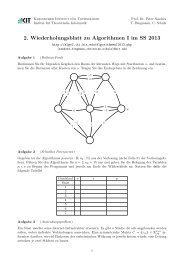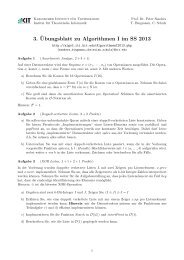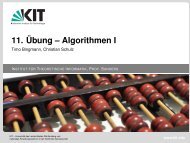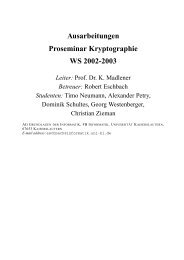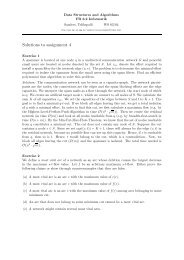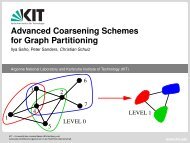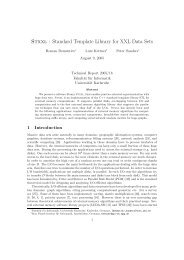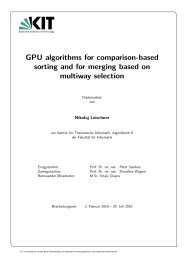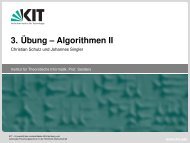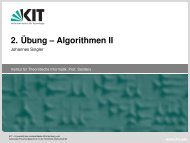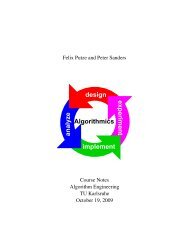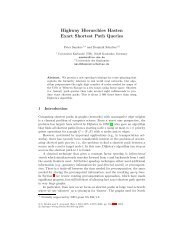LNCS 3142 - The Power of Verification for One-Parameter Agents
LNCS 3142 - The Power of Verification for One-Parameter Agents
LNCS 3142 - The Power of Verification for One-Parameter Agents
You also want an ePaper? Increase the reach of your titles
YUMPU automatically turns print PDFs into web optimized ePapers that Google loves.
182 V. Auletta et al.<br />
5 <strong>The</strong> <strong>Power</strong> <strong>of</strong> <strong>Verification</strong><br />
In this section we show that the ability <strong>of</strong> verifying the agents’ bids leads to<br />
approximation guarantees strictly better than what can be achieved without<br />
verification <strong>for</strong> the problem <strong>of</strong> Q|| wjCj. In the Q|| wjCj, <strong>for</strong> each job l,<br />
we are given a weight wl and a processing requirement Jl: this job requires<br />
Jl/s units <strong>of</strong> time when processed by a machine <strong>of</strong> speed s. In addition, jobs<br />
must be processed on the same machine without being interrupted. Thus, the<br />
completion time <strong>of</strong> each job Cl also depends on the order in which the machine<br />
processed the jobs assigned to it. <strong>The</strong> goal is to minimize the weighted sum <strong>of</strong><br />
all jobs completion times n<br />
l=1 wlCl. In [1], it is proved that, <strong>for</strong> cs ′ i and that the load<br />
li assigned to machine i by X is 0 whereas X ′ assigns load l ′ i<br />
> 0. Now observe<br />
that since si >s ′ i , we have that m(X′ , I ′ ) > m(X ′ , I) and, since X is optimal<br />
<strong>for</strong> I, we have that m(X ′ , I) ≥ m(X, I). Finally, since li = 0, we have that<br />
m(X, I) =m(X, I ′ ) which implies that m(X ′ , I ′ ) > m(X, I) contradicting the<br />
optimality <strong>of</strong> A ⋆ .<br />
References<br />
1. A. Archer and E. Tardos. Truthful mechanisms <strong>for</strong> one-parameter agents. In Proc.<br />
<strong>of</strong> the IEEE Symposium on Foundations <strong>of</strong> Computer Science, pages 482–491, 2001.<br />
2. V. Auletta, R. De Prisco, P. Penna, and G. Persiano. Deterministic truthful approximation<br />
mechanisms <strong>for</strong> scheduling related machines. Technical report, To appear<br />
in Proceedings <strong>of</strong> STACS 2004.<br />
3. V. Auletta, R. De Prisco, P. Penna, and G. Persiano. How to tax and route selfish<br />
unsplittable traffic. Technical report, To appear in Proceedings <strong>of</strong> SPAA, 2004.<br />
4. G. Ausiello, P. Crescenzi, G. Gambosi, V. Kann, A. Marchetti-Spaccamela, and<br />
M. Protasi. Complexity and Approximation: Combinatorial Optimization Problems<br />
and their Approximability Properties. Springer Verlag, 1999.<br />
5. E.H. Clarke. Multipart Pricing <strong>of</strong> Public Goods. Public Choice, pages 17–33, 1971.<br />
6. T. Groves. Incentive in Teams. Econometrica, 41:617–631, 1973.<br />
7. D.S. Hochbaum and D.B. Shmoys. Using dual approximation algorithms <strong>for</strong> scheduling<br />
problems: theoretical and practical results. J. <strong>of</strong> ACM, 34:144–162, 1987.<br />
8. N. Nisan and A. Ronen. Algorithmic Mechanism Design. In Proc. <strong>of</strong> the 31st Annual<br />
ACM Symposium on <strong>The</strong>ory <strong>of</strong> Computing, pages 129–140, 1999.<br />
9. W. Vickrey. Counterspeculation, Auctions and Competitive Sealed Tenders. Journal<br />
<strong>of</strong> Finance, pages 8–37, 1961.



